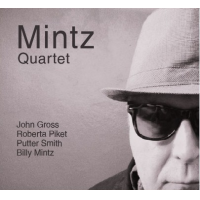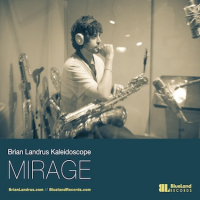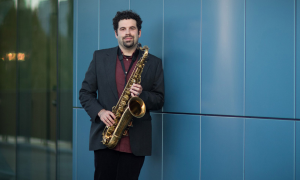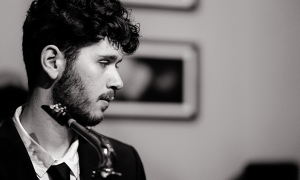Home » Jazz Articles » Take Five With... » Take Five With Fidel Cuellar
Take Five With Fidel Cuellar
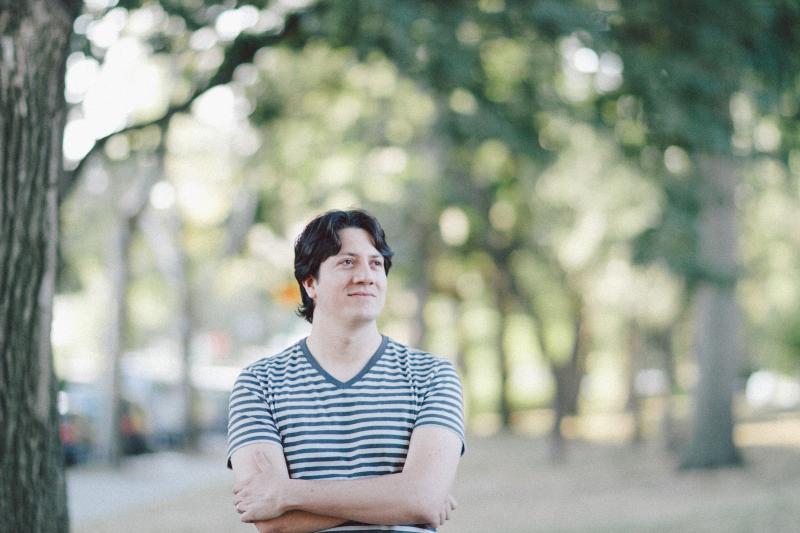
A native of Bogota, Colombia, Fidel Cuellar moved to New York City in 2007 to continue his apprenticeship as a jazz pianist and composer under the tutelage of renowned musicians like Bruce Barth, Mike Holober, and John Patitucci. In 2009, Cuellar graduated summa cum laude from the City College of New York's jazz performance program. Fidel Cuellar's stylistic versatility but distinct pianistic approach has put him in the radar of some of New York's best jazz, Latin-jazz, and world-music musicians like award-winning drummer Bobby Sanabria, flautist Carlos Jimenez and many others. Cuellar's recording credits include Thoughts (Martinete Music, 2008), by Carlos Jimenez, which features Vince Cherico on drums and bassist Ruben Rodriguez, and Future Connection, a collective jazz trio with Carlos del Pino and Rafael Monteagudo. He has performed as bandleader and a sideman in world-class venues and festivals like Iridium, Joe's Pub, The Knitting Factory, La Casita Festival at Lincoln Center, and The Highline Ballroom.
Instrument(s): Piano.
Teachers and/or influences?
At school, I studied with Mike Holober, John Patitucci, Alison Deane, Scott Reeves, and Dan Carillo. But my all time favorite private piano teacher is the great Bruce Barth.
In Colombia, my long time teacher was Ricardo Uribe. Ricardo introduced me to jazz language and theory. He also helped me work on my technique. Niko Meinhold, a German pianist, was a very big influence on me by helping me find my voice.
I knew I wanted to be a musician when...
I have felt that calling many times. It seems I sometimes even forget why I'm in this, and God sends a reminder. When I was about 12 years old, a friend handed me a copy of Keith Jarrett's Koln Concert (ECM, 1975). He found it among his grandfather's CD collection. This music opened up the world of improvisation to me. I had never heard anything like it, and this was the first time I remember thinking to myself, "I want to be this guy and play this music." Keith Jarrett's music opened the world of other amazing pianists like Herbie Hancock and Chick Corea, and eventually to all the big and legendary names in jazz from Miles Davis and on. In school, jazz styles are learned in chronological order, but in life, music doesn't come in a predetermined order.
Your sound and approach to music:
I love textures, melodies, interesting harmonies, and space! I try to avoid going for obvious and prefer trying different things. I see improvisation and arranging as one and the same—a problem solving exercise, which I draw solutions from different musical styles, eras, musicians, and schools.
Music is not just sound, it is codified in human's brains—it makes sense there. That is why it is crucial to listen, use the ears, and determine if you like what you hear when playing and writing. That is why I'm not crazy about serialists and other types of conceptual experiments where compositions are a result of a random series of notes or conceptual proposals but haven't been put to the test of human ears.
Your teaching approach:
Each student has a specific learning style, level of interest, dexterity, and knowledge. Therefore, each student needs a tailored teaching approach. Just like arranging a song, as a teacher, you have to ask yourself what approach suits this particular case the best? There are no generalized formulas or solutions.
Your dream band:
Saxophone: Jason Rigby and Mark Turner
Trumpet: Kenny Wheeler
Bass: Dave Holland
Drums: Mark Guiliana
The first Jazz album I bought was:
Probably a Beatles anthology.
What do you think is the most important thing you are contributing musically?
With so many young amazing and virtuoso players coming out of great schools and playing bebop licks up and down the scale, I feel the urge to insist on space, playing with the band, orchestrating the other musicians no matter what instrument you play, and to try to go beyond the role that is typical for the particular instrument.
Did you know...
I studied a bit of economics in college. I am very curious about stuff outside of music, especially how people think, learn, and make decisions. For a while, I thought about changing careers and explore how music thinking and proficiency in improvisation can be useful in a different field like change management.
How would you describe the state of jazz today?
I have heard the comment "I think I like jazz, but I don't understand it," countless times. Jazz was born in the spirit of improvisation, and in this sense, it sets itself apart from other styles of music for its unique flexibility and freedom of expression. Over time, people that have not been exposed, trained, or raised in the tradition of jazz have grown to see it as a niche music, and something that can only be enjoyed by the few who understand it. Remember, jazz was pop back in the day.
I feel that people need to be reminded that if they give themselves the opportunity to listen, they will be happily surprised. They will be touched, moved, and enjoy the experience of listening without having to worry about understanding the music.
Tags
Fidel Cuellar
Take Five With...
United States
Bruce Barth
Mike Holober
John Patitucci
Bobby Sanabria
Carlos Jiménez
Vince Cherico
Ruben Rodriguez
Rafael Monteagudo
Scott Reeves
Keith Jarrett
Herbie Hancock
Chick Corea
Miles Davis
Jason Rigby
Mark Turner
Kenny Wheeler
Dave Holland
Mark Guiliana
PREVIOUS / NEXT
Support All About Jazz
 All About Jazz has been a pillar of jazz since 1995, championing it as an art form and, more importantly, supporting the musicians who make it. Our enduring commitment has made "AAJ" one of the most culturally important websites of its kind, read by hundreds of thousands of fans, musicians and industry figures every month.
All About Jazz has been a pillar of jazz since 1995, championing it as an art form and, more importantly, supporting the musicians who make it. Our enduring commitment has made "AAJ" one of the most culturally important websites of its kind, read by hundreds of thousands of fans, musicians and industry figures every month.



